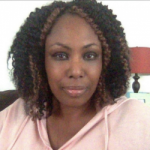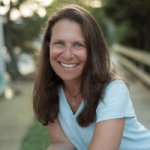
Their Father’s Daughters: Four Sisters Come Together to Say Goodbye
Deborah – last on the right – with her three sisters. (Photo courtesy Deb Copaken)
I am the eldest of four girls, a number that felt ever-so-slightly obscene. Like, couldn’t we have stopped at three? But no, we couldn’t, because numbers 3 and 4 were identical twins. Prior to their conception, Mom had read an article about how to conceive a boy. She followed it to the letter: eat this; do that; have sex at this time of the month; stand on your head and clap three times, chant a Tibetan prayer, who knows what it said? I never read it. But I have always wondered how many other babies born in 1972 have that article to thank for either their twins or their vaginas.
Each sister, in our own time, were supposed to have been named Jeffrey Scott. Instead we were Deborah Elizabeth, Jennifer Robin, Laura Suzanne, and Julie Michelle. We literally used up all the innocuous girl names. When my eldest was born, 21 years ago, my dad rushed into the hospital room to meet his first grandchild. “I don’t believe it!” he said. He ripped open the thin blanket keeping my hour-old infant warm. “Let me see that penis.”
Once, when my younger sisters were around five years old, we left one of them behind in a pizza parlor. Drove all the way home and didn’t even realize Laura wasn’t with us until the restaurant called to alert us. We had my cousin Emily along with us that night, but still. That’s how many girls we had. Enough not to notice one was missing.
Thankfully, we had an enlightened father who believed his four girls could do anything boys could but better. Dad took us fishing. He taught us how to throw a spiral. He grilled us on relativity, physics, art, politics. With him, we were feral and sneakered and grass-stained and joyful. All four of us graduated from Harvard. Laura became an orthopedic surgeon, a reaction to a hideously bloody compound fracture at 14 that had my 20-year-old self rushing her to the hospital solo, as our parents were off taking Jen to college. Jen was once a choreographer on Broadway. Julie is a marketing titan. I was a war photographer. We were those kind of girls, that kind of family.
And yet, though there was a lot of love between us, we weren’t, to my Little Women-loving chagrin, a unified whole. I left for college when the twins were still pre-pubescent, so they remained children in my eyes well into their own adulthoods. Jen and I, now the best of friends, had our differences. Two years younger, she was horrified at my adolescent pot smoking. She once walked into my college dorm room right after the mushrooms had kicked in and wept. I was not gracious, when we were younger, about including her in my life. We fought. About stupid things. I can’t even remember what.
Then, one day, our 67-year-old father called with news. “I have 2-6 months to live,” he said.
Once, when my younger sisters were around five years old, we left one of them behind in a pizza parlor. That’s how many girls we had: enough not to notice one was missing.
The four months following his diagnosis unified my far-flung sisters and me together in ways I’m still processing, all these years later. The four of us met up on the Delaware shore with Mom and Dad for two weeks of sunrises—Dad’s favorite time of day—and presence. That’s the ironic part of the imminent death of a loved one: it’s like Huxley’s mescaline, heightening the here and now into sharp focus and making it all the more beautiful.
My sisters and I launched HappyDickIsSick, to keep family and friends abreast of Dad’s decline. It was supposed to have been just for the four of us to update daily, but Dad asked for his own login after the plumber tried to get him to take Jesus into his heart. My Jewish father humored him, as was his wont. Then he wrote a delightful and compassionate blog post, the last line of which still slays me: “I have to say, whether it was Christ’s will or just Harold’s plumbing skill, the toilet now flushes beautifully.”
Later, as he grew sicker, we took turns spending time in his company and encouraging his vast extra-curricular interests and talents: our lifelong lawyer father, a diligent weekend artist, created enough new artwork, post-diagnosis, to fill the walls of the exhibit my sisters organized while I was on book tour and then some.
On his last night on earth, a snowstorm was brewing outside the hospital room in Johns Hopkins where my sisters and I were holed up together with Mom, trying to keep our final goodbyes from sounding too maudlin, cliché, or trifling. Which of course was impossible. Mom, understandably, was losing her mind. This is a woman who can’t fall asleep if her checkbook is off by a penny. Or if a dish is left in the sink. The rapid upheaval and lack of control over the daily ravages of Dad’s pancreatic cancer had denied her hyper-on-top-of-it superpower self from both phone booth and cape.
It is an odd truism that some people, upon hearing of the death of a loved one, laugh. It’s a reaction that seems wildly inappropriate at the time, but, in fact, it’s as normal a reaction to tragedy as tears, and it springs from the same emotional well: the knowledge that we all must die. My mother’s particular reaction to the doctor telling us that Dad had fewer than 48 hours left to live was to step out of the hospital room and call the funeral home.
She made an appointment for the following morning, an hour from the hospital, at 8 AM. My sisters and I looked at one another with alarm, our expressions louder than words. You could practically feel the vibrations of rationality mixed with pathos bouncing between us. “Um, Mom,” I said, “it’s okay. We don’t have to go to the funeral home before he dies. They’re used to dealing with that kind of stuff after the fact.”
Mom was adamant. It was her way of trying to control the uncontrollable. If she had an appointment set up, surely Dad would stay alive until after she returned. My sisters and I understood this, without a word passing between us. That’s how sisters, at their best, work: as a group mind meld. We also understood that it was useless trying to argue with her.
Laura, the doctor, pulled me aside. “Listen,” she said, “Jen, Julie and I will stay here in Baltimore with Dad. You take Mom back to Potomac and get her to the funeral home in the morning. If Dad shows any signs of a leaving us, I will call and make sure you get here in time, okay?” The little girl I’d once driven to the hospital with a bone sticking out of her foot, her blood soaking the seat of the family station wagon, was now fully charge. Of all of us.
Mom and I drove to my childhood home in flurries that were growing thicker. At 4 AM, Laura called. “Get here now,” she said. “You have about an hour. Sorry. It all started going downhill faster than I expected.”
We were 45 minutes away. And it was snowing, hard.
I woke up my mother. At this point, the combination of the trauma of what was happening plus the lack of sleep had stolen her brain. She was trying to stave off the inevitable through everyday actions. She insisted on taking a shower. She came downstairs into the kitchen and started putting random paperwork into a FedEx envelope. “What are you doing?” I said. “We have to go.”
“We have to stop at FedEx first,” she said, as if we were on our way to the mall to buy socks.
At this point, all three of my sisters were dialing our two cell phones non-stop. “Where are you?”; “What the fuck?”; “How much longer?” they kept asking, in increasingly desperate tones.
“We’re stopping at FedEx,” I said.
“Um, okay,” said Jen, with admirable calm. “That’s an interesting choice. Please get here as fast as you can.”
Laura called to say she would steal a bolus of water to keep Dad alive for a little while longer. Jen called several more times to check on our ETA. Julie called crying. Dad was already unconscious, as he had been for the past 24 hours. I wanted to be there for him, of course, but at this point we needed to get there for my sisters.
When we finally arrived at the hospital, we sprinted down the hallway into Dad’s room. The death rattle was unmistakable. Dad was struggling to breathe. My sisters were bent over him, sobbing. It was too much. To this day, I can’t take in the image. I know it happened, and I know I was there and saw what I saw, but I remember it all from a bird’s eye view, as if floating above.
Mom was so traumatized by the scene, she transformed into a Borscht Belt comedian as a way of coping, cracking inappropriate jokes that to this day make my sisters and me laugh: a gift, in retrospect. “Well, Dick,” she finally said, grabbing his hand. “We’ve been together for forty five years…” She paused, trying to find the next part of that sentence. When her Borscht belt madness kicked in again, that’s when the magic happened.
My sisters, again without a word passing between us, brought her down to Dad’s feet, so she could rub them. That left two spots on either side of him: right arm, right leg, left arm, left leg. We were each holding a piece of Dad now, whispering, “I love you,” over and over. That’s when it occurred to me that my three sisters and I were the perfect number of daughters. One fewer, and an extremity would have been left unmanned. One more, and someone would have been left on the outskirts of the circle.
The minute Dad took his last breath, a beam of sunrise burst into his room, illuminating my sisters’ hair like halos. I suppose when it’s my turn to go, that’s how I’ll remember them: lit up, unified, a sturdy wall of sobbing angels propping up what was left of the world.
Join Our Final Live Storytelling Event of the Year!
2 Responses
-

Monica That was simply beautiful. Thank you for sharing such a personal experience.
-
Joshua Jake Gorgeous! Glorious! Thank you for sharing this.
Leave a Reply



Tell Us in the Comments
What do you think?